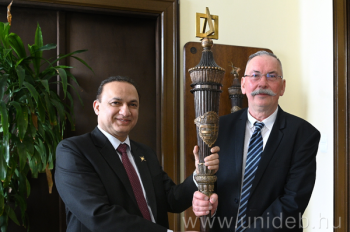
Strengthening International Cooperation Through Education: The Role of University of Debrecen and Oman
International collaboration in higher education continues to grow as universities seek to foster cross-border partnerships that benefit students, faculty, and communities. The University of Debrecen in Hungary exemplifies this trend through its expanding cooperation with Oman, aiming to enhance academic exchange, student mobility, and research initiatives. This partnership is not only broadening the academic horizons for students from both countries but also contributing to the development of specialized fields such as medical sciences, agriculture, IT, and cyber security.
Recent discussions between the representatives of Oman and the University of Debrecen highlight the strategic importance of this collaboration. The visit of Malallah Albalushi, the Omani ambassador to Hungary, underscores the commitment to strengthening ties and increasing Omani student enrollment in Hungarian universities, particularly at the University of Debrecen. Such initiatives are vital in fostering cultural understanding, sharing expertise, and developing joint projects that align with international development goals.
Current State and Future Prospects of Education and Training Collaboration
The University of Debrecen hosts a diverse international student body, with 11 Omani students currently enrolled across various faculties such as engineering, health sciences, and agriculture. The university’s participation in the Stipendium Hungaricum scholarship scheme serves as a foundation for these exchanges. The ambassador’s call to expand the number of students in fields like agricultural sciences, medical sciences, IT, and artificial intelligence reflects a broader strategy to address global challenges through education.
Moreover, the university’s infrastructure supports cultural exchange and community cohesion through dedicated cultural centers like the Confucius Institute for Chinese culture and the Russian Cultural and Language Centre. The planned Turkic Corner demonstrates the university’s intent to create a welcoming environment for students from different backgrounds, including those from Arab countries. Such cultural initiatives are instrumental in creating an inclusive academic community that promotes mutual respect and understanding.
Enhancing Academic and Research Networks
University of Debrecen’s extensive domestic and international network enables fruitful collaborations in research and innovation. The university’s four-helix model engages industry, government, financial institutions, and academia to implement projects aligned with regional and global priorities. This model may serve as a blueprint for future joint ventures with Oman, fostering research in sustainable agriculture, healthcare, and digital technologies.
Practical Steps for Expanding Oman-Hungary Educational Collaboration
To effectively broaden this partnership, several strategic actions can be undertaken:
- Increasing scholarship opportunities: Expanding available scholarships in high-demand fields will attract more Omani students to Hungary, especially to the University of Debrecen.
- Developing joint academic programs: Creating dual-degree or joint research programs in areas like cyber security and medical sciences can enhance the appeal and quality of education.
- Facilitating faculty exchanges: Encouraging academic staff exchanges and collaborative research projects will strengthen institutional ties and promote knowledge sharing.
- Building cultural and community centers: Similar to the Turkic Corner, establishing cultural hubs for Omani students can foster a sense of community and cultural immersion.
- Organizing joint conferences and workshops: These events will increase visibility for the partnership and offer platforms for idea exchange and networking.
Impacts and Benefits of International Cooperation in Education
Expanding cooperation between the University of Debrecen and Oman offers numerous benefits:
- Enhanced student mobility: More opportunities for Omani students to study in Hungary, enriching their academic and cultural experiences.
- Talent development: Access to high-quality education and training will produce skilled professionals ready to contribute to their home economies.
- Research advancements: Collaborative projects can lead to innovations in sectors critical to both countries’ development plans.
- Diplomatic and cultural ties: Educational partnerships serve as a foundation for broader diplomatic relations, fostering mutual understanding.
Building Sustainable Educational Partnerships
The visit of the Omani ambassador to the University of Debrecen exemplifies the potential of strategic international cooperation driven by education. As universities continue to open their doors to global partners, policies should focus on creating sustainable, mutually beneficial programs that prepare students for the demands of a rapidly changing world. Both the University of Debrecen and Oman are poised to strengthen their partnership, fostering an environment of academic excellence, innovation, and intercultural exchange.
Interested in learning more about the University of Debrecen’s programs? Fill out the form to receive personalized guidance from an expert counselor. You’ll gain support in selecting the right program, understanding admission requirements, and navigating the application process, helping you confidently start your academic journey in Hungary.

